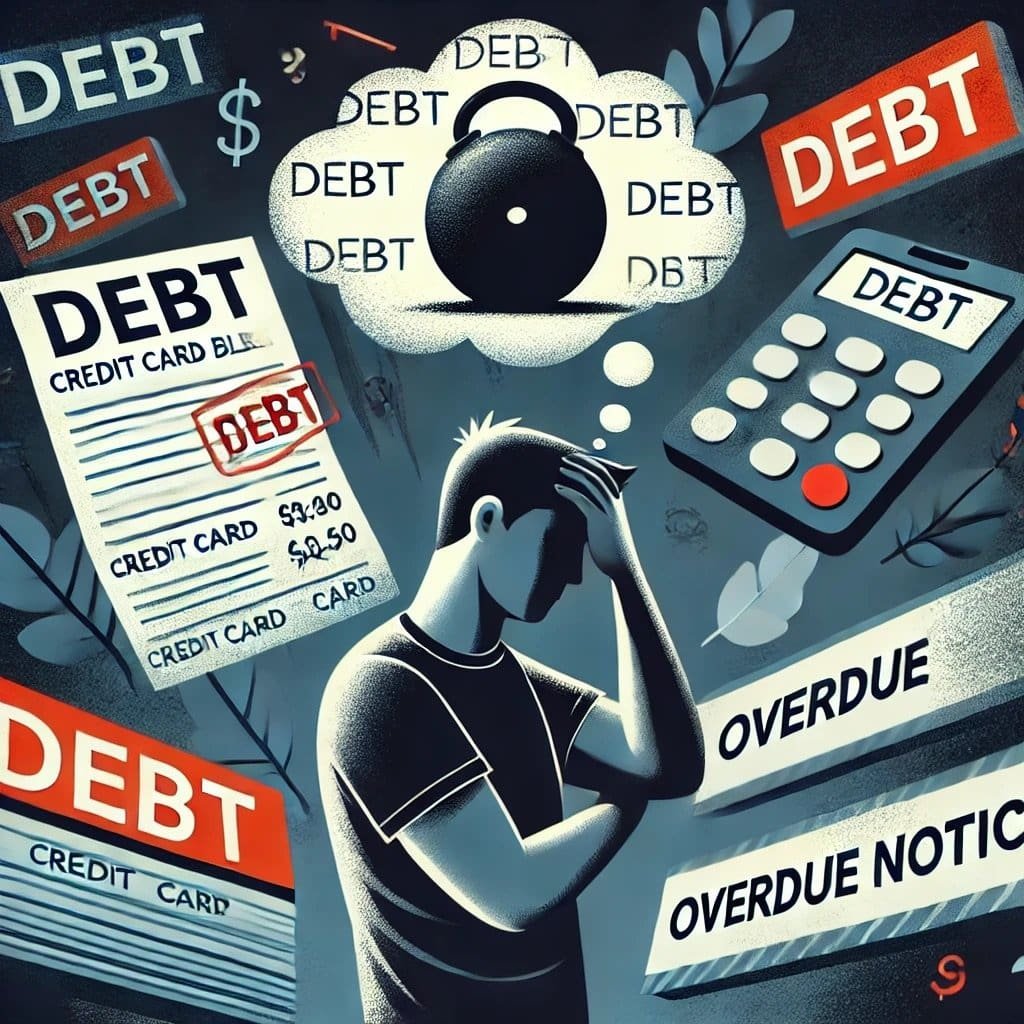Debt is not just a financial burden—it can have a significant psychological impact, causing stress, anxiety, and even depression. Whether it’s credit card debt, student loans, or unpaid medical bills, the pressure to manage debt can take a toll on mental health. Here’s an exploration of the psychological effects of debt and strategies to cope with the emotional weight it carries.
1. The Psychological Burden of Debt
Debt can create feelings of fear, guilt, and even shame, especially when it feels like it’s spiraling out of control. Some common emotional effects of debt include:
• Stress and Anxiety: Constantly worrying about how to make payments or cover living expenses can lead to chronic stress. This stress can affect sleep, concentration, and overall well-being.
• Depression: The feeling of being trapped in debt can lead to hopelessness. When debt seems insurmountable, individuals may experience depression, particularly if it affects their ability to enjoy life or see a way out.
• Shame and Guilt: Many people feel personal shame or guilt over their debt, believing they’ve made poor financial choices. This can make it difficult to talk about debt or seek help, deepening the emotional burden.
• Fear of the Future: Debt can create fear about future financial security. Concerns about losing a job, unexpected expenses, or mounting interest payments can trigger constant worry.
2. The Impact on Relationships
Debt can strain relationships with family members, friends, and partners. Financial stress can lead to arguments, misunderstandings, and even resentment if one partner feels burdened by the other’s debts. Open communication about finances is essential to avoid tension and work together on managing debt.
3. How to Cope with the Emotional Impact of Debt
Managing the psychological effects of debt requires both practical financial steps and strategies to protect your mental health. Here’s how to cope:
• Acknowledge the Situation: The first step is to confront your debt and accept the reality of the situation. While it’s natural to feel overwhelmed, avoiding the issue will only worsen the emotional toll.
• Create a Debt Plan: Once you’ve acknowledged the debt, create a realistic plan to tackle it. This might include creating a budget, prioritizing high-interest debts, and setting up automatic payments to avoid missed deadlines. Having a plan can help reduce feelings of helplessness.
• Seek Professional Help: If managing debt alone feels overwhelming, consider working with a financial advisor or credit counselor. They can help you create a strategy, negotiate with creditors, and explore debt relief options.
• Practice Mindfulness and Stress-Relief Techniques: Managing your mental health is crucial. Incorporate stress-relieving practices into your daily routine, such as meditation, deep breathing exercises, or regular physical activity. These can help reduce anxiety and improve mental clarity.
• Set Small, Achievable Goals: Breaking down your debt into smaller, manageable chunks can make repayment seem more attainable. Celebrate small victories, such as paying off a credit card or saving money by cutting unnecessary expenses.
• Talk to Someone You Trust: Don’t carry the emotional burden alone. Talking to a trusted friend or family member about your debt and how it’s affecting you can provide emotional support. You might also consider seeking therapy to address the psychological effects of debt.
4. Build a Support System
Developing a support network can be invaluable when dealing with debt. Surround yourself with positive, understanding individuals who can offer emotional encouragement and practical advice. Support groups for debt management or financial counseling services can provide a sense of community and remind you that you’re not alone in facing financial challenges.
5. Focus on Financial Education
One way to regain a sense of control is by improving your financial literacy. Educating yourself about debt management, budgeting, and personal finance can empower you to make better financial decisions. This can also reduce fear and anxiety, as you’ll feel more equipped to handle your finances.
6. Prioritize Self-Care
Debt often leads to neglecting self-care, but it’s important to prioritize your mental and physical well-being. Make time for activities that bring you joy, even if they’re low-cost or free, such as reading, exercising, or spending time with loved ones. Taking care of yourself can help alleviate some of the emotional strain caused by debt.
7. Avoid Comparison
It’s easy to feel inadequate when comparing yourself to others who seem to be financially secure, especially on social media. Remember that everyone’s financial situation is different, and comparing yourself to others can worsen feelings of guilt or shame. Focus on your own progress and the steps you’re taking to improve your financial health.
Conclusion
The psychological impact of debt is real and significant, but by taking steps to manage both your finances and mental health, you can regain control and reduce its emotional toll. Creating a solid debt repayment plan, seeking help when needed, and focusing on self-care are crucial strategies for coping with the stress and anxiety that debt brings. Remember, managing debt is a journey, and with time and effort, you can lighten the emotional and financial load.


